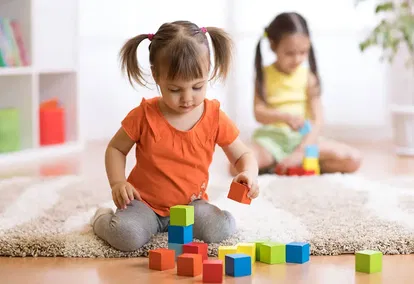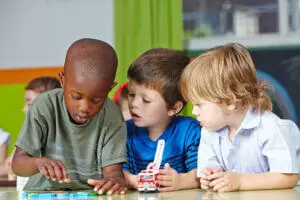Exploring the Social-Emotional Growth of Preschoolers: Me, Myself, and I
February 16, 2023

“For you formed my inward parts; you knitted me together in my mother’s womb. I praise you, for I am fearfully and wonderfully made. Wonderful are your works; my soul knows it very well.”
—Psalm 139:13–14 (ESV)
Working with preschoolers provides a unique glimpse into the journey of growth through which we all travel. We can see little arms and legs as they lengthen and strengthen and pass from sitting to crawling to stumbling to running. What we often do not see as clearly is a preschooler’s journey through the developmental stages God designed for their emotional and spiritual maturity.
As a Mission Friends leader, you have the unique opportunity to influence the preschoolers under your care by meeting them where they are and helping them grow as God has designed.
Esteem-building in preschoolers is most effective when we are the guide and the preschooler is at the center of their own development. We observe without judgement, then describe what we see using the word you followed by an active verb.
Examples include, “I see you colored the entire picture.” Or, “You remembered the first word of the Bible thought.” Avoid the use of observations that place the approval on the observer. Instead of saying, “I am proud of you,” consider “I see a smile on your face. You look proud of yourself.”
Babies are learning to trust their world.
A teacher’s consistent presence is important. Babies feel secure when comforted by touch and a calm voice when speaking or singing to them. Reading books to a baby builds a healthy emotional bond. We model appropriate emotional responses through facial expressions and calm reactions.
Identifying and naming the emotions we observe provides a foundation for babies to develop a healthy relationship with the world around them.
Twos and threes are beginning to recognize their emotions.
Though they are learning, they may feel powerless as they control their emotions. Twos and threes are experiencing more interaction with the world around them, and their emotional responses may be inappropriate. We can guide them by recognizing and naming the feelings we observe.
It is important for this age to begin to understand that all of their feelings are valid. The journey toward a healthy self-image will seek to teach them appropriate responses when they have feelings that may appear today as an outburst. This is an important time for trusted adults to model behavior that teaches empathy for others, helping them learn that other people have feelings just as they do.
Fours and fives are learning to control their impulses and react in socially acceptable ways.
We can teach cooperative play skills and how to include others in their world through play. This age asks for active engagement from the teacher so they feel heard and valued. Experiencing conflict provides teachable moments to discuss the feelings of others.
Helping preschoolers continue to move from a “me-centered” world to an “others-centered” world is an important step in their journey to emotional maturity and their spiritual development.
by Teri Ussery
More BLOG POSTS IN THIS SERIES:
This article first appeared in March-April-May 2023 Mission Friends Leader. Each quarter of Mission Friends Leader, the curriculum piece for preschool missions discipleship, provides practical information on working with preschoolers, achieving effective teaching and learning opportunities, and growth and development of preschoolers.

